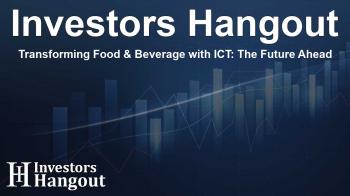Transforming Food & Beverage with ICT: The Future Ahead

The Role of ICT in Transforming the Food and Beverage Sector
In a landscape of rapid change, the Food and Beverage sector is undergoing a significant transformation, driven by Information and Communication Technology (ICT). This transformation is set to accelerate with a projected compound annual growth rate (CAGR) of 10.79% through the year 2030. Today’s consumers demand not just efficiency but also personalization and transparency, prompting companies in this sector to invest heavily in digital solutions.
Understanding Consumer Expectations
As customer expectations evolve, food and beverage companies recognize the necessity to adapt. Modern consumers are looking for personalized experiences and products that meet their unique needs. This rising demand is pushing companies to rethink their operational strategies, leading to investments in digital technology aimed at enhancing the overall customer experience and optimizing supply chains.
Key Areas of Digital Investment
In order to keep up with consumer trends, several ICT domains are being prioritized. Application development and deployment, analytics, artificial intelligence, data management, and communication tools are all becoming essential components of modern food and beverage operations. These technologies facilitate improved production monitoring, smarter inventory management, and efficient customer engagement strategies.
Adapting Supply Chains for Future Growth
According to industry experts, organizations in the food and beverage space are re-evaluating their supply chain paradigms. Leveraging advanced ICT solutions allows companies to build more robust production systems and agile distribution networks. By integrating real-time data exchange systems, companies can enhance their ability to meet consumer demand while reducing waste.
The Importance of Real-time Data Exchange
The integration of real-time data is crucial for food and beverage companies aiming to stay competitive. Intelligent forecasting, alongside effective data management strategies, not only improves responsiveness but also helps in maintaining sustainability. In a sector where the shelf life of products can be critical, tools that provide insight into production and logistics works wonders for operational efficiency.
Competitive Landscape and Key Players
The competitive landscape in the food and beverage sector is being transformed by leading ICT providers. Companies like SAP, Oracle, Microsoft, and many others are playing pivotal roles by providing comprehensive solutions tailored to industry needs. This has enabled brands to achieve unprecedented visibility and efficiency across their operations, ultimately benefitting consumer interaction.
Benchmarking Against the Best
Market reports highlight the need for continuous benchmarking against leading technology vendors. By evaluating capabilities such as automation and digital experiences, food and beverage companies can recognize gaps in their current approaches and strategize accordingly. This comparative view fosters innovation and helps businesses to remain at the forefront of digital transformation.
The Path Forward for Food and Beverage Vendors
As the food and beverage sector continues to evolve, the ability to leverage technology will determine future success. Companies that can adeptly respond to the challenges posed by modern consumers will not only thrive but will set the industry standards. The importance of maturity in digital capabilities cannot be overstated; it is essential for balancing efficiency, innovation, and effective customer engagement.
The Value of Sustainable Practices
With sustainability rising as a priority, ICT vendors that provide secure and scalable platforms will be crucial. The future landscape will be defined by companies capable of addressing the unique challenges of production processes while ensuring data integrity and security. By preparing for the next wave of transformation, food and beverage companies can position themselves as leaders in a competitive market.
Frequently Asked Questions
What is the projected growth rate of ICT in the Food and Beverage sector?
The ICT market in the Food and Beverage sector is projected to grow at a compound annual growth rate (CAGR) of 10.79% through 2030.
How are consumer expectations affecting the Food and Beverage industry?
Consumers are increasingly seeking personalized experiences and transparency, compelling companies to invest in digital technologies that enhance customer engagement and operational efficiency.
Which ICT domains are significant for Food and Beverage companies?
Key ICT areas include application development, analytics, data management, communication, and process automation, all of which are essential for optimizing operations and enhancing consumer interaction.
What role does real-time data play in the industry?
Real-time data is critical for improving decision-making, managing inventory effectively, and ensuring sustainability, all of which contribute to enhanced operational performance.
Who are the leading ICT providers in the Food and Beverage sector?
Top vendors include SAP, Oracle, Microsoft, and numerous others who provide comprehensive solutions aimed at improving efficiency and visibility across food and beverage operations.
About The Author
Contact Logan Wright privately here. Or send an email with ATTN: Logan Wright as the subject to contact@investorshangout.com.
About Investors Hangout
Investors Hangout is a leading online stock forum for financial discussion and learning, offering a wide range of free tools and resources. It draws in traders of all levels, who exchange market knowledge, investigate trading tactics, and keep an eye on industry developments in real time. Featuring financial articles, stock message boards, quotes, charts, company profiles, and live news updates. Through cooperative learning and a wealth of informational resources, it helps users from novices creating their first portfolios to experts honing their techniques. Join Investors Hangout today: https://investorshangout.com/
The content of this article is based on factual, publicly available information and does not represent legal, financial, or investment advice. Investors Hangout does not offer financial advice, and the author is not a licensed financial advisor. Consult a qualified advisor before making any financial or investment decisions based on this article. This article should not be considered advice to purchase, sell, or hold any securities or other investments. If any of the material provided here is inaccurate, please contact us for corrections.

